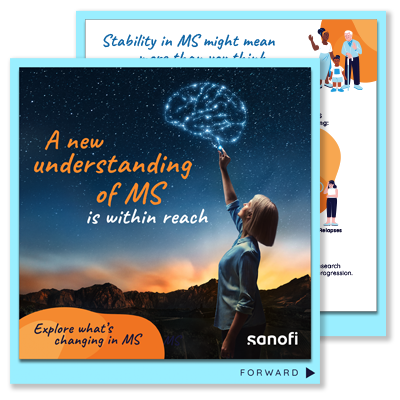MS Resources
It's important to always talk to your doctor about how you're feeling. In the meantime, here's additional information to help guide the way.
Download Brochure

Want to share important information from this site? Save and send this helpful resource.
Keep exploring the evolving science of MS
Frequently Asked Questions
About the MS processes
If a person living with MS notices changes or worsening symptoms over time, they may be experiencing symptoms related to the chronic smoldering process. Even if MRI activity hasn't changed or relapses are controlled, tracking symptoms and signs can help communicate concerns to a healthcare provider.
No matter the type of MS, the acute process and chronic smoldering process can be happening at the same time. They’re both a part of MS. The acute process primarily causes relapses and MRI activity, and the chronic smoldering process can cause disability progression.
Today's MS therapies have come a long way in how they treat the acute process to control relapses and MRI activity. But many people with MS still experience disability progression. That means there's more to address when it comes to the chronic smoldering process.
The chronic smoldering process begins from the very start of MS and can continue over time. Its symptoms (like brain fog, debilitating fatigue, or balance issues) build up, so they may not be obvious until years into living with MS.
Watch the video to learn more about the acute and chronic smoldering processes.

BTK plays an important role in the acute process and the chronic smoldering process. Addressing BTK in both processes is one of the strategies currently being researched.
Questions about progression and stability in MS
People living with MS can experience disability progression even when they don't have a mobility issue or a visible disability. In fact, many people experience cognitive challenges that aren't easy to see. Whether it's changes to physical symptoms, cognitive symptoms or both, disability progression is how healthcare providers describe these changes.
When daily challenges add up over time, this could be a sign of disability progression. Here are a few ways disability progression can affect normal, everyday activities:
- Struggling to find the right words
- Difficulty remembering appointments
- Lacking the energy to do usual activities
- Being unable to exercise the way you used to
- Parking closer to your destination
- Forgetting if you already did something
- Tripping or losing balance unexpectedly
Signs like these can be easy to ignore or attribute to something like aging. But when someone makes changes to how they work, socialize, or perform physical tasks, it could be because of MS.
Here are a few things that doctors may recommend to help people living with MS deal with cognitive and physical challenges.
- Rehab led by a speech, occupational, and/or physical therapist
- Therapy, meditation, mindfulness, and/or other mental health practices
- A healthy diet and regular exercise
- Support groups that connect you to others with MS
There's more to MS than standard MRIs can show. That's why people living with MS can still experience symptoms, even without MRI activity.
Historically, stability has been understood as having control over relapses and MRI activity. Now it’s becoming clear that for MS to be truly stable, relapses, MRI activity, and cognitive and physical abilities (disability progression) must all be under control.
Some changes in life might be because of aging, but they also could be signs of the chronic smoldering process. For example, debilitating fatigue, memory trouble, or difficulty with physical activities are all important signs that should be discussed with healthcare providers.
Glossary
Definitions of important terms